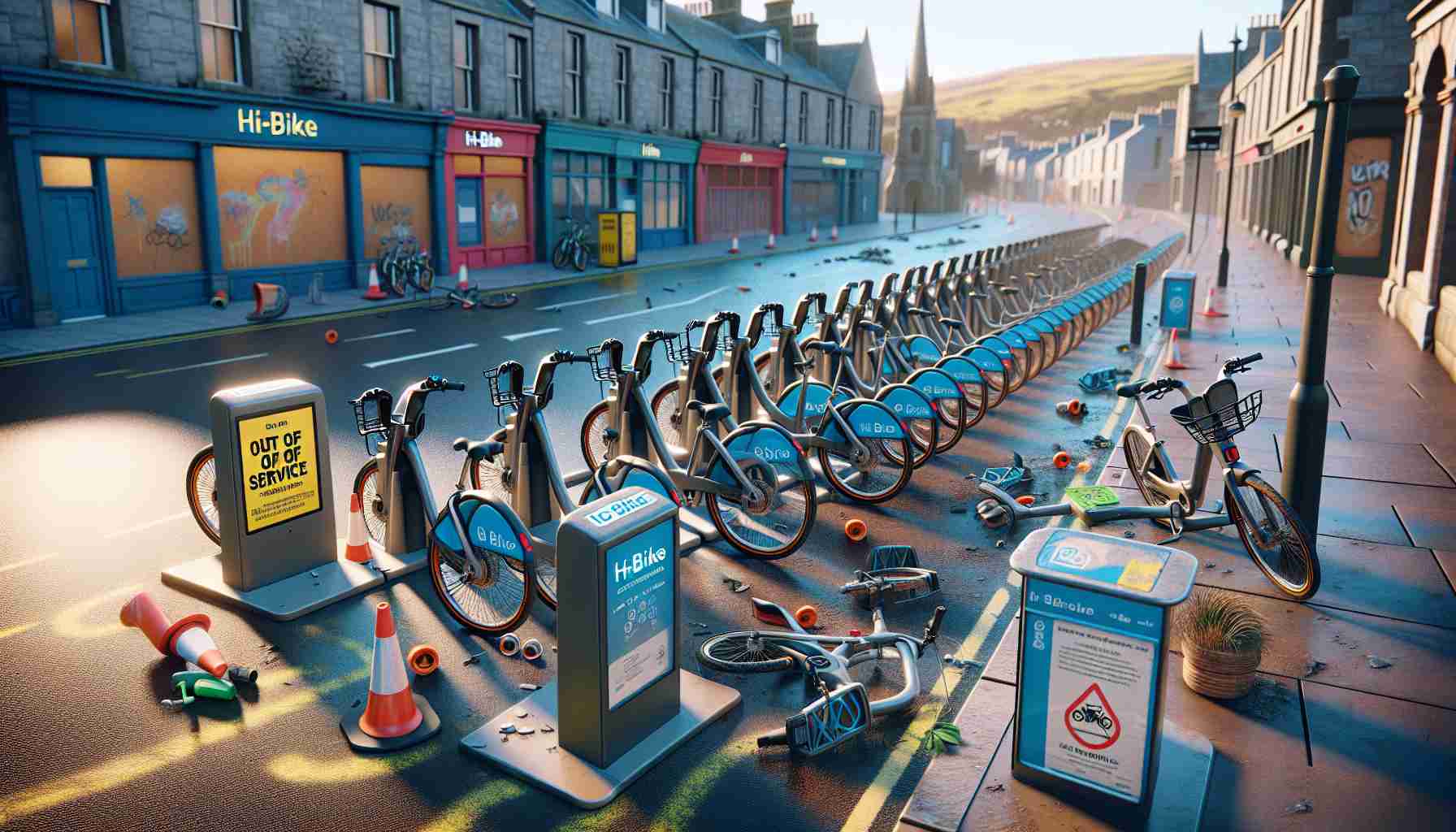The Hi-Bike e-bike share scheme in Inverness has been forced to suspend its services due to an alarming increase in vandalism. Nearly all of the 50 bikes in the scheme have been damaged, causing approximately £100,000 worth of destruction. The bicycles have been crashed, broken, thrown into rivers, and even targeted by individuals attempting to forcibly remove them from charging stations.
In a recent social media post, Hi-Bike stated that the Inverness branch had been subjected to an “obscene amount of vandalism” over the past five days. As a result, the system has been temporarily closed, causing inconvenience to legitimate users. Only around six to eight bikes remain undamaged, while the Fort William Hi-Bike system remains operational.
Authorities, such as the Highlands and Islands Transport Partnership (Hitrans), which established the e-bike share scheme, have expressed dismay at the surge in vandalism, particularly during the Easter holidays. Incidents involving young people sitting in the bikes’ front baskets have also been reported.
To address the issue, Hi-Bike has cooperated with Police Scotland and the British Transport Police, sharing CCTV footage in the hopes of identifying the culprits. The company has urged the public to discreetly share any information they may have regarding the acts of vandalism.
Unfortunately, the Hi-Bike scheme in Inverness is not the first victim of rampant vandalism in the e-bike and e-scooter industry. Previous cases, such as Sunderland’s e-scooter scheme and Peterborough’s e-bike share scheme, have faced similar challenges due to persistent acts of destruction.
While Hi-Bike plans to repair and secure the damaged bikes and charging docks, it remains uncertain when the scheme will resume operation. The company aims for the system to be fully repaired and to have confidence that it can operate safely. As the investigation continues and efforts to deter future vandalism are implemented, the inconvenience caused to legitimate users is deeply regretted.
The surge in vandalism experienced by the Hi-Bike e-bike share scheme in Inverness highlights a concerning issue within the e-bike and e-scooter industry. Similar incidents of destruction have been reported in other cities, indicating a broader problem that needs to be addressed.
The e-bike and e-scooter industry has been rapidly growing in recent years, with more and more cities implementing shared mobility schemes. These schemes offer a convenient and eco-friendly mode of transportation for residents and visitors. However, the increase in vandalism poses a significant threat to the sustainability and success of these initiatives.
Market forecasts for the e-bike and e-scooter industry have been positive, with analysts predicting continued growth in the coming years. However, if the issue of vandalism is not effectively addressed, it could deter potential investors and users from participating in these shared mobility schemes.
Authorities, such as the Highlands and Islands Transport Partnership (Hitrans), have expressed their concern over the recent surge in vandalism. They understand the importance of these schemes in reducing congestion and carbon emissions and are working closely with Hi-Bike to find a solution to the problem.
To combat vandalism, Hi-Bike has collaborated with the police, sharing CCTV footage in an attempt to identify the culprits responsible for the damage. They have also called on the public to provide any information they may have regarding these acts of vandalism.
Unfortunately, the Hi-Bike scheme in Inverness is not an isolated case. Other cities, such as Sunderland and Peterborough, have also faced similar challenges with their e-scooter and e-bike share schemes. This demonstrates the need for a more comprehensive approach to addressing the issue, involving not only the companies and authorities but also the communities in which these schemes operate.
While Hi-Bike aims to repair and secure the damaged bikes and charging docks, the timeline for resuming operations remains uncertain. The company must ensure that the system is fully repaired and that measures are in place to prevent future acts of vandalism before restarting the scheme.
In conclusion, the alarming increase in vandalism experienced by the Hi-Bike e-bike share scheme in Inverness highlights a significant issue within the broader e-bike and e-scooter industry. Efforts must be made to address this problem effectively to ensure the long-term success and sustainability of shared mobility schemes. Authorities, companies, and communities must come together to find solutions that not only deter vandals but also promote a sense of ownership and responsibility among users.







